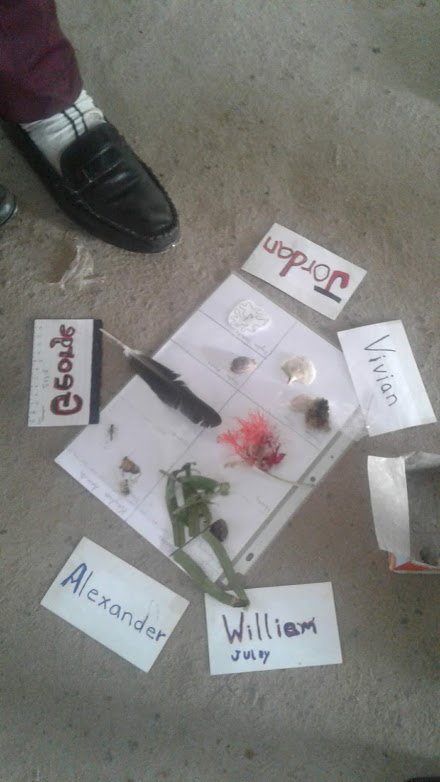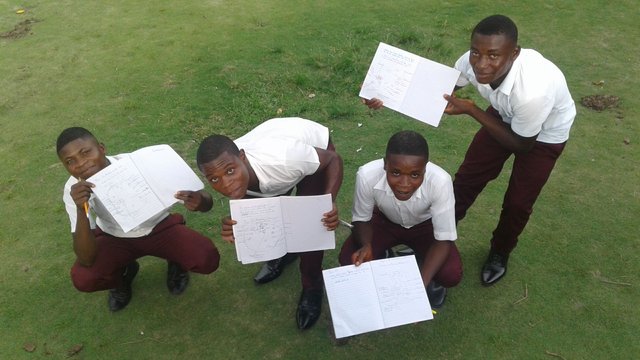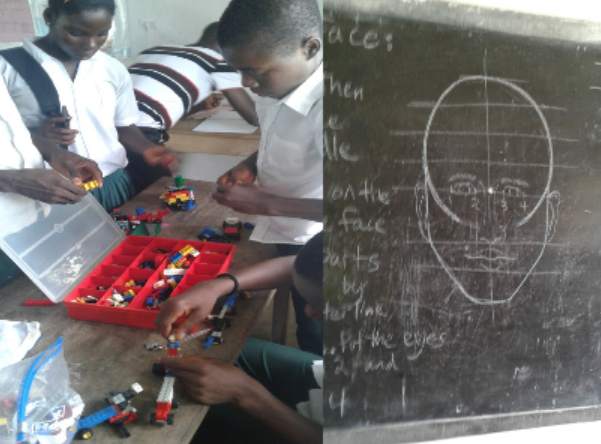On the Scholastic Front...
To evaluate my 10th and 11th grade students I am employing Performance-Based Grading tactics – a favorite among Peace Corps teachers in small-to-medium sized classrooms. It is, in my opinion, a forward way of assessing learners in that it solves several issues found in most Liberian classrooms. Instead of points being garnered from projects to quizzes to participation, students can only earn points through individually demonstrating mastery of a topic. Each marking period presents 4-6 topics, with point values varying according to difficulty and time spent on a topic in class. The sum of the points available is 100 – representing a perfect final grade. When a student gets every question (and no less) correct for a specific topic, they earn all the points for that topic.

Kingdoms of Life for 10th Grade Biology. Students in
groups raced to properly classify the 10+ organisms.
After a mid-period quiz on all topics, students are able to come on their own time to master topics one by one. Students come and tell me the topic they wish to attempt and I write several problems for them to complete over 25 minutes. If they “deuce it” (earn 100% on the topic test), they are pronounced masters of the topic and can help fellow students extracurricularly and during review periods. If an attempt ends in anything less than mastery it serves as a learning experience. Committed learners often come back the next day to retry. The period ends with a final exam – a conglomerate of all topics in which any grade made is final – no ifs, ands, or buts.
This grading system addresses several challenges that are commonplace in Liberian classrooms. Spying (n. - cheating in the classroom) is seen as helping a friend and enables students to lighten the burden of studying. This means some students only learn how to copy the letters and shapes on their neighbor's paper, advancing to classes far beyond their learning level. There are no neighbors when taking a topic test by your one – and thus spying is non-existent. Students must prove their knowledge individually. And it works. Students cannot beg for grades; “Mr. H bring me up small, I beg you” is easily responded to by saying “You had your chance – remember this next period.” Students are afforded practically endless opportunities for practice and those who attempt more earn higher marks. After each attempt students receive immediate feedback to guide their efforts for the next go-around.

From left to right: Benedict, William, Bahway, and Oliver.
Other extracurricular activities – perhaps more enticing to the average student, have included the student football games and Quizzing competitions. The Old Student vs. New student Game was a rousing battle. The new students were eager, nimble, and lively while the old students played as such – a bit lazily and reliant on a few of the all-stars. I was rooting for the new students. Unfortunately, they lost in a last minute 1-2 defeat. Hear the voice of our self-appointed school reporter below on the day of the event. Also see the last photo for some bonus extracurriculars!

(Let's be honest, doesn't matter what age you are, Legos are splendid),
and students learning to draw proportionally realistic human faces.
Some very interesting teaching and grading approaches, @jhimmel.
Do you return the topic test back to students?
Yep I give it back to them unless they deuce it, in which case I take it to enter in my gradebook later. I have to vary the questions for every retake!
#ded
Kids there must be very happy to have a dedicated teacher like you, @jhimmel.